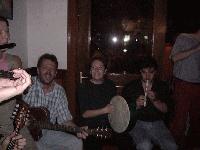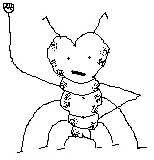

An itinerant bunch of traditional/contemporary Celtic musicians and singers with a loyal following in Hanoi, Vietnam and friends and former members around the w
The Social Weevils are a fluid bunch of musicians and singers who perform sets of traditional and contemporary Celtic tunes and songs from Ireland and Scotland. The band's first CD, "One for the Road," was recorded on January 3, 2000 at the Army Recording Studios in Hanoi, Vietnam, using instruments that were mostly cheap and/or broken. On that CD the Social Weevils were Peter Taylor (button accordion, guitar, mandolin, vocals), Kevin Higgins (tenor banjo, mandolin), Don McIntyre (fiddle), Huub Buise (guitar, vocals), Bob Baulch (guitar, vocals), and Mary O'Keeffe (vocals on one song). On Christmas Eve, 2000, the band recorded another CD, "Live at the R&R," at the R&R Tavern in Hanoi, Vietnam, thanks to owner Jay Ellis his wife and their son, and Ralph Raymond at the 4-track mixing board. The line-up that night was Peter Taylor on all his usual instruments and vocals, Don McIntyre on his fiddle, Ann Russell on recorders, Alec Soucy on tin whistle, Genvieve Thibault on bodhran and accapela vocals, Mary O'Keeffe providing Irish and English vocals, Joe Peters on guitar, mandolin and vocals, and assorted other friends (instruments, vocals, hand claps and foot stomps). The band's second studio CD, "Over the Ocean," was recorded in March 2004 at Kien Quyet Studio in Hanoi. The line-up for that album included Don McIntyre (fiddle, vocals), Anna Russell (recorders), Liz Druitt (bass clarinet), Darryl Rees (guitar, vocals), & Joe Peters (guitar).
Song Info
Track Files
Story behind the song
Lyrics
On
Playlists